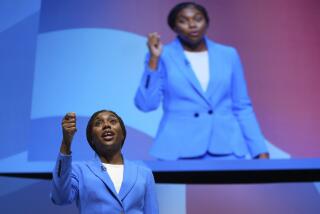Left-winger Corbyn elected to lead British Labour Party
- Share via
LONDON �� The Labour Party elected its most socialist leader in at least 30 years Saturday, signaling a further drift away from the free-market policies that brought the party electoral success under Tony Blair.
Jeremy Corbyn won 59.5 percent of the vote to succeed Ed Miliband as opposition leader. His nearest rival, Andy Burnham, won 19 percent.
A fierce critic of Chancellor of the Exchequer George Osborne’s spending cuts, Corbyn won over Labour supporters with his appeal to scrap Britain’s nuclear weapons, nationalize the railways and energy companies, and fund infrastructure projects.
“Our party has changed. We’ve grown enormously, because of the hopes of so many ordinary people for a different Britain, a better Britain, a more equal Britain,” Corbyn, 66, said in a speech in central London.
Prime Minister David Cameron, who stands to gain from splits in the opposition, has accused Corbyn of being in denial about the need to cut the deficit and ridiculed the leadership election. Labour has “completely vacated the intellectual playing field,” he said in a speech on Friday.
Corbyn, who has spent 32 years in Parliament on the fringes of the Labour Party, went from the 200-to-1 outsider to runaway favorite, after a surge of people signed up to support the party after its election defeat.
He nonetheless has the support of less than 15 percent of Labour members of Parliament, and having voted against his party hundreds of times, he may struggle to unite them.
“Labour members electing Corbyn is an act of political stupidity unparalleled since Caligula appointed his horse to the Roman Senate,” said Steve Fielding, professor of politics at the University of Nottingham. “Given his unwillingness to compromise his views with the opinions of millions of the British electorate, Corbyn is more qualified to lead a pressure group than a party that seriously aspires to government.”
Corbyn’s victory is part of a shift across Europe in recent years, as voters deserted center-left parties after the financial crisis forced governments to cut public-sector jobs and benefits.
While his rallies were regularly packed as he won the backing of young people, veteran activists and labor unions, the other leadership candidates Burnham, Yvette Cooper and Liz Kendall failed to inspire comparable levels of excitement and support.
The tone of the election was set by the opening question in the first TV debate between the candidates: “How do we get away from Tony Blair’s legacy?” they were asked.
Blair, who repeatedly urged Labour activists not to vote for Corbyn, won three elections by accepting many of Margaret Thatcher’s free-market reforms and moving away from socialist and pacifist positions. He lost support over his decision to join the 2003 invasion of Iraq, stepping down before the financial crisis eroded the credibility of center-left parties across the continent.
First elected to Parliament in 1983, Corbyn took controversial positions from the start. In 1984, weeks after the Irish Republican Army came close to killing Thatcher with a bomb, he invited members of the group’s political wing, Sinn Fein, into Parliament. He has also regularly shared speaking platforms with supporters of Hamas and Hezbollah.
Corbyn was one of the founders of the Stop The War coalition, a group set up in 2001 to oppose action against Afghanistan. He remains its chairman.
Unlike the other, younger, leadership candidates, Corbyn has never been a Cabinet minister or a party spokesman. His most senior leadership role was as chairman of the planning committee on a London council, from 1980 to 1981.
(c)2015 Bloomberg News
Visit Bloomberg News at www.bloomberg.com
Distributed by Tribune Content Agency, LLC.
More to Read
Sign up for Essential California
The most important California stories and recommendations in your inbox every morning.
You may occasionally receive promotional content from the Los Angeles Times.













